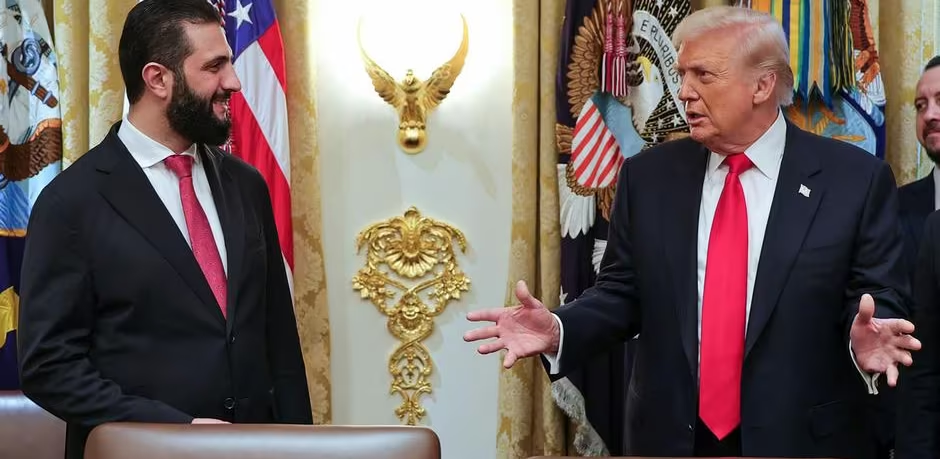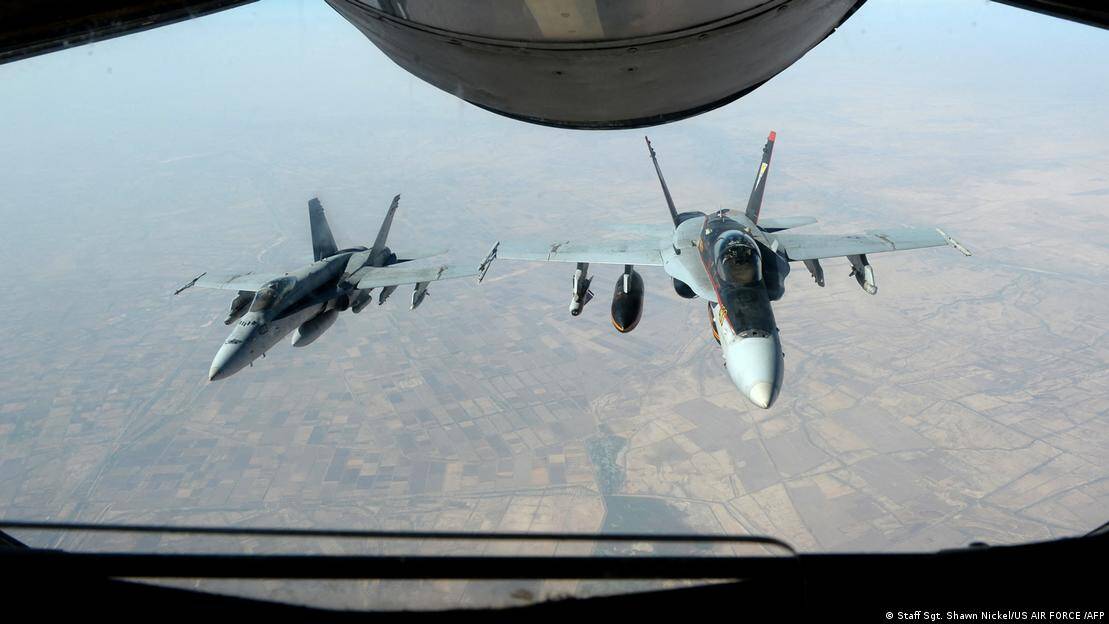Syrian leader in Washington: Start of a new regional order?
DW | 12.11.2025 01:03
Long-time observers of politics in the Middle East called it a "surreal" moment.
Syria's interim president, Ahmad al-Sharaa, who formerly fought with al-Qaeda and was jailed by the US as a terrorist, was welcomed at the White House by US President Donald Trump — even if he and his delegation did arrive for the meeting through a side door.
Also surreal for some: The fact that a former al-Qaeda member would then also sign his country up to the global coalition fighting the extremist "Islamic State" group. The "Islamic State," or "IS," group was originally an offshoot of al-Qaeda in Iraq.
But in fact, Hayat Tahrir al-Sham, the militia group al-Sharaa eventually formed actually split from al-Qaeda in 2016, and focused more on fighting the regime of Syrian dictator Bashar Assad. The militia, known as HTS, was also opposed to the "IS" group and battled it inside Syria for years.

'Islamic State' in Syria still dangerous
So, Syria becoming the 90th member of what is officially called the Global Coalition against Daesh (the organization uses the Arabic acronym for the "IS" group) actually makes sense. It is also a logical move because "IS" remains a threat inside Syria.
Between 2,500 and 3,000 "IS" loyalists are still in Syria and in the year since the Assad regime was ousted, they have increased their activities.
"[The 'IS' group] thrives on instability and chaos," Tanya Mehra, a researcher at the International Centre for Counter-Terrorism, or ICCT, in the Netherlands, wrote in a recent opinion piece. "The more internal fighting among rebel groups and the more the de facto government has to deal with attacks from neighboring [countries], the more favorable the situation becomes for ISIS," using another common acronym for "IS."
The "IS" group exploited security chaos following the fall of the Assad regime to reestablish presence in parts of Syria it had previously left, researchers at the Washington-based Middle East Institute, or MEI, confirmed in an October analysis.
Extremists' new strategy
The group now operates with much smaller cells, of only around 10 fighters each, who conduct rapid night ambushes or plant improvised explosive devices. Also in "IS's" revised repertoire are lone wolf attacks, blackmail to fund its operations — it apparently offers new recruits $400 (€346) a month in pay — and exploiting the intercommunal divisions that already threaten Syria's stability.
Syrian media reports that the group has been trying to recruit more members and gain favor with locals by targeting former members of the Assad regime. It is trying to sell itself as the only party that will take real revenge and achieve "justice" after 14 years of civil war. The group has also been trying to infiltrate the ranks of the new Syrian security forces, in order to spy, recruit and sell itself there too, Syrian journalists say.
"According to field observers, these developments reflect a shift toward a strategy of 'flexible dormancy,'" the MEI researchers explained, "centered on endurance and disruption rather than territorial control."
As "IS" activities have increased, so have operations by Syrian security forces against it. Last weekend, Syrian security forces conducted over 60 raids around the country, arresting 71 individuals associated with the "IS" group. Some of those raids were reportedly based on information received from the US. And in other cases, too, the Syrians had already been cooperating with the global coalition, well before officially becoming members this week.
A bigger deal than it seems?
There are more implications to Syria joining the global coalition than just the ongoing fight to contain extremist violence.
The move will likely impact Syrian Kurdish groups that control northern parts of Syria and who have been negotiating with the government in Damascus as to how and where they fit into the new Syrian political system.
Syria's Kurds were semi-independent throughout the civil war and the main Kurdish group, the Syrian Democratic Forces, or SDF, played an essential role battling the "IS" group between 2014 and 2019. The SDF now manages large camps and several prisons, holding an estimated 45,000 "IS" members and their families.
As a result, the SDF became the US's most important partners on the ground, combatting the "IS" group and receiving funding, arms and training from the Americans.
But now that the Syrian government also plans to play an official part in combatting the "IS" group, that will "undermine the SDF's exclusive status as the coalition's [only] official partner in Syria, thereby weakening its leverage in negotiations with the Syrian government," MEI researchers argued.
But it could also lead to better relations between Damascus and the SDF, the ICCT's Mehra told DW. "The SDF have been crucial in combatting 'IS' and I don't necessarily see al-Sharaa joining the anti-Daesh coalition as a step back," she argues. "The government in Damascus will hopefully rely on integrated SDF fighters who have considerable experience in combatting 'IS.'"
Over the past week, news agency Reuters has also reported rumors that, as a result of Syria joining the coalition, the US might establish a base near Damascus.
Local media reported that a delegation from the global coalition against "IS" visited Al-Seen air base, around 80 kilometers (50 miles) from Damascus in the Syrian desert. There are also rumors that a Trump hotel or tower could be built in Damascus.
Observers say a new US base would put to rest suspicions about al-Sharaa's own previous links to extremist groups in some American quarters, as well as assuage Israeli fears about Syria becoming a threat to it. Such a US presence would also diminish the influence of other countries in Syria, including Iran, Russia and even Turkey.
"This is part of the larger picture … I think it is more than symbolic," Mehra suggests.
"All signs point toward a US vision of integrating the new Syria firmly into the Washington-led regional order," Marc Lynch, a professor of political science and international affairs at George Washington University, wrote in Foreign Policy magazine this week. This "represents one of the shrewdest things the Trump administration has done in the Middle East," Lynch added on his personal blog.
There are basically two main obstacles to this working out, Lynch suggests. Al-Sharaa's ability to navigate intercommunal divisions, including with the SDF, and Israel, the academic says.
"Israel has stood defiantly outside this US-led support for al-Sharaa's state-building efforts," Lynch writes. "If the US really does establish an air base in Damascus, it would quickly be forced to grapple with the fact that the most dangerous and destabilizing external threat to Syria currently is Israel. That makes Syria the unexpected leading edge of the little-noticed emerging divide in priorities between the US and Israel, which could have wide-ranging implications for the regional order," Lynch concluded.









